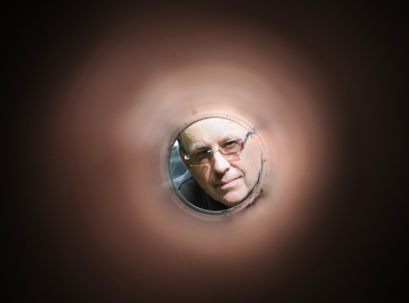Continental self
There is always something foreboding about the prose of lone wolf sailor Roger D. Taylor. And his latest book MingMing & the Tonic of Wildness is no exception.
At first you think something dreadful is going to happen: he is going to be left shipwrecked, clinging to a crumbling hunk of the polystyrene he stuffs his boats with to stop them sinking. He will be dismasted off Greenland and be found months later: frozen like Scott, half-out of his sleeping bag with a scattering of Brazil nuts over his unfinished log. He will be caught living ashore in a croft in the Outer Hebrides making up his passages into the Arctic, a la Crowhurst.
But after a while something even worse happens: you realise the true abyss he is voyaging through is the human condition. Roger is on a journey to the centre of the self and having got there, abandoning it. And what a journey. This man is an amalgam of every artist who has tried to explain the meaning of life – from writer Joseph Conrad, through film-maker Stanley Kubrick to painter Francis Bacon.
But unlike them his conclusions are not opaque. Because the universe is ‘Dementia on a heroic scale, driven not by the logic of mind but the causality of unrestrained force’ deep down man is frightened by it. ‘It could well be that the constructs of our lives, with their myriad ruses to give an impression of order and permanence and control are an attempt to mask this deep-seated fear,’ he writes.
On his tiny 21ft, junk-rigged, second-hand bilge-keeler, Roger sails alone into the ‘deep and frigid ocean’ and: ‘Being as close as I was, I could stroke the tiger, and stare into its eye, and feel its very breath on my cheek, and so know it a little better.’
He already knows he is not afraid of being dead: ‘Nor was I afraid of dying alone; I have long accepted that there is no alternative.’ No his fear is of dying before he’s finished the mission. It has taken Roger to his 65th year before he has finally realised what his life is about: sailing and writing. ‘Therein lay my most acute fear: my work was not yet finished. I was still too young to die.’
Yes, of course, you will say, it’s time running out that scares us. And Roger would agree, but it is speed which is the true enemy, speed burns up Time. Speed is the peak oil of Time, pace the more efficient fuel.
Roger has reached the conclusion that two knots or ‘to put it in its more effervescent form, one thousand bubbles per minute, is the decisive speed…fast enough to get there, slow enough to miss nothing on the way,’ he writes equating his passage-making to hiking across the ocean.
This in turn leads our skipper to ‘live in the now’. Nothing new in that and yet look at what he manages to jettison upon this existential revelation:
‘…the gradual shedding of the land-bound persona…the passported self, the stamped, taxed and censored self, the Nationally Insured self, the Travelcarded, Senior Rail carded, licensed, pensioned, passworded…the internet-tracked self, the closed circuit televised self, the national data-based self, the socially networked self, the self as the object of incessant marketing, the self as one of seven billion sales opportunities..’
I was pleased when at last this Zen mastery crumbled into at least one superficiality, one selfish motive, one egotistical move, one sheer piece of vanity: Roger’s desire to be able to read 80 degrees N on his GPS.
When he got there he blew Mingming’s foghorn to himself and turned for home.
Had Melville sailed solo this is the book he would have written.
MingMing & the Tonic of Wildness, The Fitzroy Press £9.99




